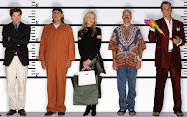 I will write my thoughts on the Battlestar Galactica finale (as soon as I go through two more boxes of tissues and accept the fact that the greatest thing to ever happen to me is over)... but in the meantime, I have pasted a Q&A that Alan Sepinwall had with Ron Moore, both one-on-one and also at a Sci-Fi screening. Details are below. Do NOT read if you haven't seen the finale!!! Also, any use of the word "I" should be read as Sepinwall. There are some VERY interesting thoughts on how music plays an "eternal" role for humanity.
I will write my thoughts on the Battlestar Galactica finale (as soon as I go through two more boxes of tissues and accept the fact that the greatest thing to ever happen to me is over)... but in the meantime, I have pasted a Q&A that Alan Sepinwall had with Ron Moore, both one-on-one and also at a Sci-Fi screening. Details are below. Do NOT read if you haven't seen the finale!!! Also, any use of the word "I" should be read as Sepinwall. There are some VERY interesting thoughts on how music plays an "eternal" role for humanity.After Sci Fi Channel screened the "Battlestar Galactica" series finale for the press on Monday evening, there was a brief press conference featuring producers Ronald D. Moore and David Eick, and stars Mary McDonnell and Edward James Olmos. Later in the evening, I asked Moore some additional questions about the finale. After the jump, some highlights from the press conference (really only from Moore and Eick), and then a transcript of the solo interview with Moore. To read my review of the finale, click here.
Post-finale press conference
(On what the second Kara actually was, and whether we all went down a rabbit hole when we assumed that Kara was the daughter of Daniel the missing eighth Cylon)
Moore: Daniel was definitely a rabbit hole, and it was an unintentional rabbit hole, to be honest... (Daniel) was always intended to be an interesting bit of backstory about Cavil, as a Cain and Abel allegory. And people started seizing on it as some major part of the mythology... and it was never intended to take that kind of load-bearing weight.
Eick: It's kind of like Boxey in that way.
Moore: It's exactly like Boxy. Kara, I think, is whatever you want her to be. It's easy to put that label on her: Angel, or Messenger of God, or whatever. Kara Thrace died and was resurrected and came back and took the people to their final end. That was her role, her destiny on the show... We debated back and forth in the writers' room for a while on giving it more definition, and saying, definitively, "This is what she is," and we decided that the more you try to outline it and give voice to it and put a name on it, the less interesting it became. We just decided this was the most interesting way to go out, with her disappearing without trying to name what she was.
(On whether any of the Cavils, Simons or Dorals survived the attack on the Colony)
Moore: The final (edit) came out a little less clear on that level than I sort of intended... The idea was that when Racetrack hits the nukes, they smack into the Colony and it takes it out of the stream swirling around the singularity, and it fell in (to the singularity) and was torn apart. But as we were cutting the show for time, and taking out frames, one of the things that became less apparent was that the Colony was doomed. The intention was that everyone aboard the Colony perished.
(On when and why he decided to have the fleet wind up discovering our Earth in the distant past)
 Moore: We decided that a couple of years ago... I don't think we ever had a version of the show where they wound up in the future, or the present. Those didn't seem as interesting. In the early going, we started talking about the fact that we would see a lot of contemporary things in the show, from language to wardrobe to all kinds of production design. That only made sense to us if a lot of the things we see in the show you feel are taken from our contemporary world were actually from their world and spread through the eons and came to us through the collective unconscious, or from (what Lee said about) "We will give them the best part of ourselves."
Moore: We decided that a couple of years ago... I don't think we ever had a version of the show where they wound up in the future, or the present. Those didn't seem as interesting. In the early going, we started talking about the fact that we would see a lot of contemporary things in the show, from language to wardrobe to all kinds of production design. That only made sense to us if a lot of the things we see in the show you feel are taken from our contemporary world were actually from their world and spread through the eons and came to us through the collective unconscious, or from (what Lee said about) "We will give them the best part of ourselves." Eick: There was a time we were talking about, "They land and there are pterodactyls and tyrannosaurus rex." But it was the idea that they were part of the genis of humankind, and this seemed the more affordable way to do it than going "Jurassic Park."
Moore: The image of Six walking through Times Square, we came up with a long time ago.
(On what happened to destroy the original Earth)
Moore: The backstory of the original Earth was supposed to be that the 13th tribe of Cylons came to that world, started over, and essentially destroyed themselves. There was some internecine warfare among the Cylons themselves that was supposed to be another repetition in the cycle of "All this has happened before and all will happen again." Even they, who were the rebels and split off, left to their own devices, there was enough of humanity left in them that they destroyed themselves.
(On why Cavil killed himself)
Moore: Cavil killing himself came from Dean Stockwell, to be honest. As scripted, in that climactic battle in CIC, Tigh was going to grab Cavil and fling him over the edge of the upper level, and he was going to fall to his death. Dean called me himself and said, "I just really think that in that moment, Cavil would realize the jig is up and it's all hopeless and just put a gun in his mouth and shoot himself." And I just said, "Okay."
(On the history of "All Along the Watchtower" in the "Galactica" universe)
Moore: The notion is that the music, the lyrics, the composition is something divine, it's eternal. It's something that lives in the collective unconscious of the show, it's a musical theme that repeats itself. It crops up in unexpected places, and people hear it, or pluck it out of the ether. It's sort of a connection of the divine and the mortal -- music is something that people literally catch out of the air... Here is a song that transcends many different aeons and cultures across the star, and was reinvented by one Mr. Bob Dylan.
Eick: It was a simple way to communicate the idea clearly that this is not the future. This is the story of a culture that gave birth to ours. There was an episode in season one in which Helo and Sharon are running for their lives and they hole up in a diner, and there's a Cylon centurion cornering them, and for the longest time we planned to have an old jukebox in the diner that would play, "Yesterday," or whatever we could afford.
Moore: Probably not "Yesterday."
 Eick: Okay, something from The Guess Who. I think we felt it was too soon, and would confuse things. It would be so non-specific that people would just be thrown by it. But we were thinking about it that far back, that music would be a great way to tell the audience about the cyclical theme... All the colloquialisms and slang that you hear, and how people interrelate... we get that from them, not the other way around.
Eick: Okay, something from The Guess Who. I think we felt it was too soon, and would confuse things. It would be so non-specific that people would just be thrown by it. But we were thinking about it that far back, that music would be a great way to tell the audience about the cyclical theme... All the colloquialisms and slang that you hear, and how people interrelate... we get that from them, not the other way around. (On whether Head Six and Head Baltar are angels or demons)
Moore: I think they're both. We never tried to name exactly what the head characters were, we never looked at them as angels or demons. They seemed to periodically say good things or evil things, to save people or to damn people. There was a sense that they worked in the service of something else... that was guiding and helping, sometimes obstructing, sometimes tempting. The idea at the end was that whatever they're in service of is eternal and continues, and whatever they are, they too are still around, with all of us who are the children of Hera. They continue to walk among us and watch.
Ron Moore interview
When I talked to you at summer TCA, I ran through that checklist of unanswered questions.
Oh, yeah! What do you think?
You nailed pretty much every one. I think people are going to debate about Kara.
I accept that. I knew, when I decided this was as much as we were going to say about Kara, I said, "People are going to be pissed."
 I don't want to spend too much time on Daniel, but did you realize that you were giving Kara's father this name that was so similar to Daniel?
I don't want to spend too much time on Daniel, but did you realize that you were giving Kara's father this name that was so similar to Daniel?That I had no idea. I only found that out online. I went, "Is that true? I guess it is." It's one of those things where you're inside the show and doing it, you don't realize that people are going to seize on this detail and it gets a life of its own. When I saw that stuff spreading online, I was really astonished. "Really? Daniel? They're obsessed with Daniel." So I started telling every interviewer, "Please tell people not to focus on Daniel, because they're really going to be disappointed."
This was a very dark, very bleak show, that had, for the most part, a happy ending. Were you ever tempted to go the dark way? Why did you decide to end it the way you did tonally?
I guess I always assumed it was going to end on some sort of note of salvation -- that they would find a home and be okay, at least some of them. I didn't want to end the series like "Beneath the Planet of the Apes," with the destruction of everybody. Although that's what Eddie wanted to do. Eddie kept pitching me that they come to Earth in contemporary times, and everyone's cheering and happy, and cut to the White House and the President goes, "Nuke 'em!" And they destroy Galactica -- cut to credits. And people say I'm dark!
I was literally never tempted to go that way. I always felt that however brutal the show was, and how bleak it felt in moments, it was never nihilistic. It was never about saying that people are irredeemable. It was about trying to be honest about people, saying, "Look at us. We are capable of all these things. Really good people do horrible things and horrible people do good things."
Given how often you used the show to comment on current events or, at least, draw current events in the show, do you feel that the finale in any way speaks to what's happening now?
Only in the sense of where it finally ends up in the very end: the robotics and where we are about to be technologically. I just saw something the other day with a scientist saying we're going to have a true (artificial intelligence) within five years or something crazy. Or these Japanese robots that look like the woman in the finale, they're getting more currency. It's been an old saw in science fiction for a long time, since Frankenstein, that we're going to create life that's going to turn on us. Well, we're right there, and we should probably really think about these things and understand the door we're about to go through.
 I'm curious about a few characters' final fates. You very easily could have gotten away with Helo sacrificing his life so Athena could go after Hera, but they got the happy ending in the end.
I'm curious about a few characters' final fates. You very easily could have gotten away with Helo sacrificing his life so Athena could go after Hera, but they got the happy ending in the end. There were two things. One, originally when we were breaking the story, Athena and Helo were both going to die to save Hera. And then I felt sort of unsatisfied about that. I really wanted that family unit to survive to the end. So in the script, when Helo gets shot in the corridor and he's left, I didn't intend it to be a cliffhanger of "is he going to die?" I just kept writing it, and there wasn't a moment to establish he was okay. And when Tahmoh read the script, he got that point and said, "Oh, (bleep), I'm dead." And when he got to the end, he was surprised.
And then it becomes this tearjerking moment when you see the three of them off in the distance (on Africa) and you realize he survived and they're intact.
And when Tahmoh had that reaction, I decided, "Well, now I definitely don't want to establish that he's okay," because I wanted people to have that same reaction.
Well, did anyone else almost die and then you gave them a reprieve in the end?
We did talk, for a long time, that Adama and Laura were going to get in a Raptor together and fly off into the stars, and Adama was going to show her the universe, and that would be the last we see of them. And before I ever even wrote it, Mary got wind of that and called me and said, "You know what? In our very first conversation about the show, we agreed Laura would die. I feel it's important to actually show it," and I said she was absolutely right, so she died on camera and Adama lived on camera.
Because when he said goodbye to Lee like that, I assumed he was going to wait for Laura to die and then crash the Raptor or something.
I knew people would have that reaction.
So he's going to be like Tyrol, just live off by himself?
He's going to build that little cabin, and who knows what.
Aaron Douglas keeps saying, "Well, you know what? They're going to get a message. Someone's going to trudge up the hill to Adama and hand him a note, saying, 'Tyrol needs you in Scotland!' And Adama will put on his pack and go off to Scotland!"
 Given how much of the show was made up on the fly by you and the other writers, looking back, how well do you think everything hangs together with the finale factored into it?
Given how much of the show was made up on the fly by you and the other writers, looking back, how well do you think everything hangs together with the finale factored into it?I think it hangs together better than it has any right to. I do feel good that the process I always believed in and really defended -- about feeling the story instinctively as you go through it, and not being tied to, "Oh, we know exactly how it's going to end up" -- that that was true. We were able to get there and could say, "We've been making this mosaic, and now we just need to put the final touches on it and we'll have a complete picture." There's loose threads and things that don't quite work, but I think that's in the nature of almost any show. By and large, I think we did a pretty good job of it.
The thing I wonder about is the head characters and how (important they were). There's that moment at the end where Caprica Six says something like, "That's it? You just needed us to carry Hera into that room and protect her?"
Well, if you look over the life of the show, they certainly did more than that. But ultimately, that was the key moment that makes everything else possible.
Some of what Head Six is doing is keeping Baltar alive and free, but when she's encouraging him to start the cult, and get the cult armed and all that, is that just her screwing around for her own amusement?
No, I think that she's moving him towards an acceptance of the divine. Baltar could not make that speech in CIC unless he had gone through a religious conversion. If he didn't have a belief in something greater than himself, he couldn't have made that argument to Cavil in that moment.













































.jpg)

